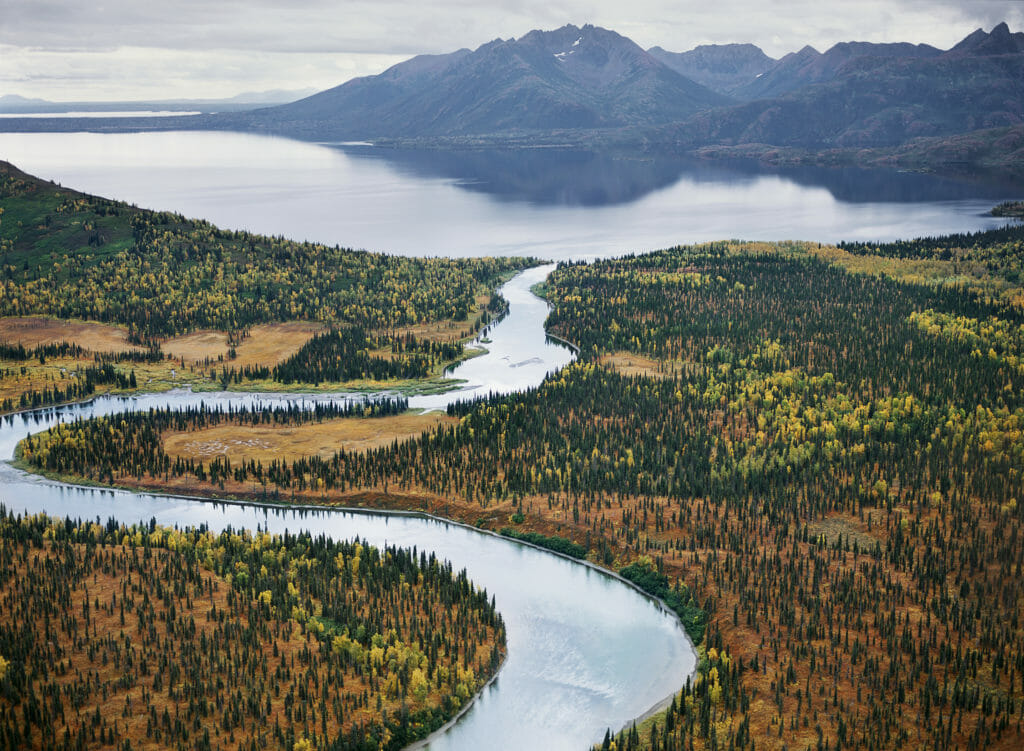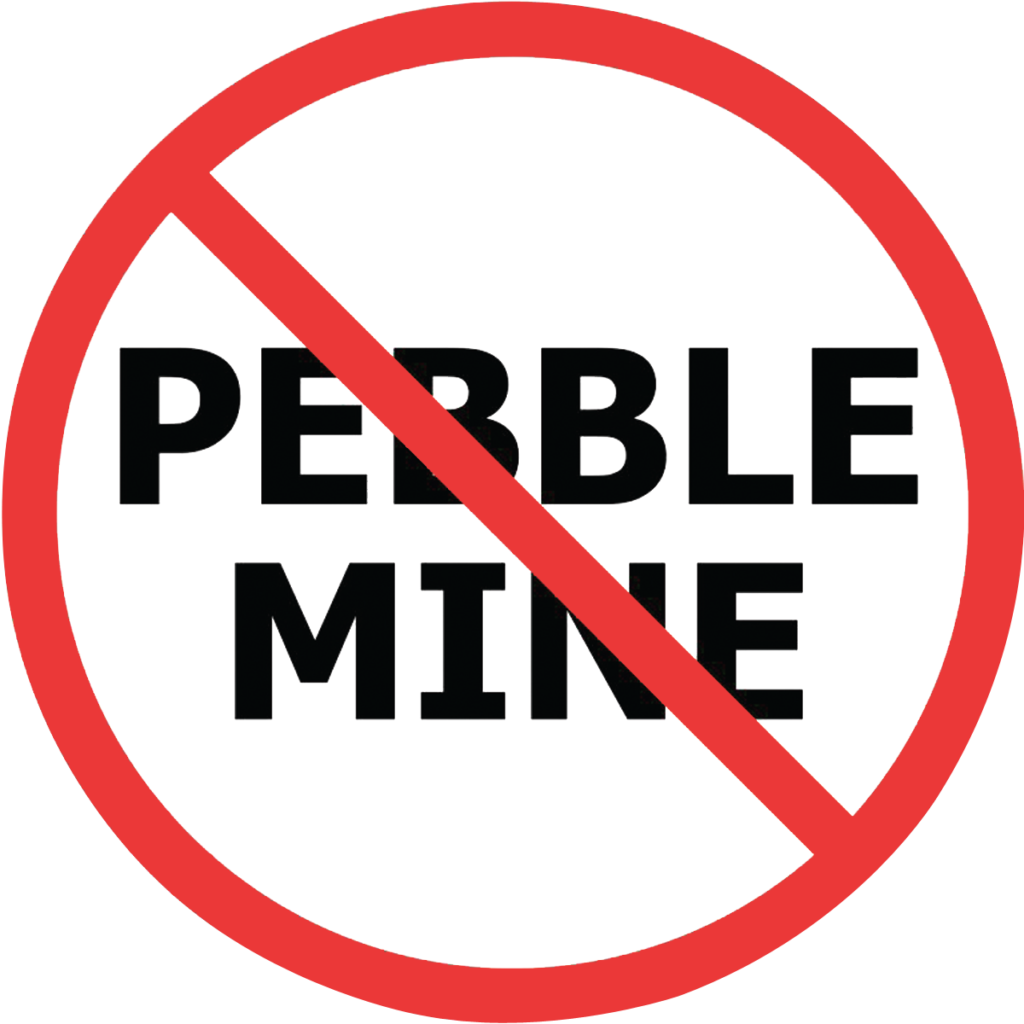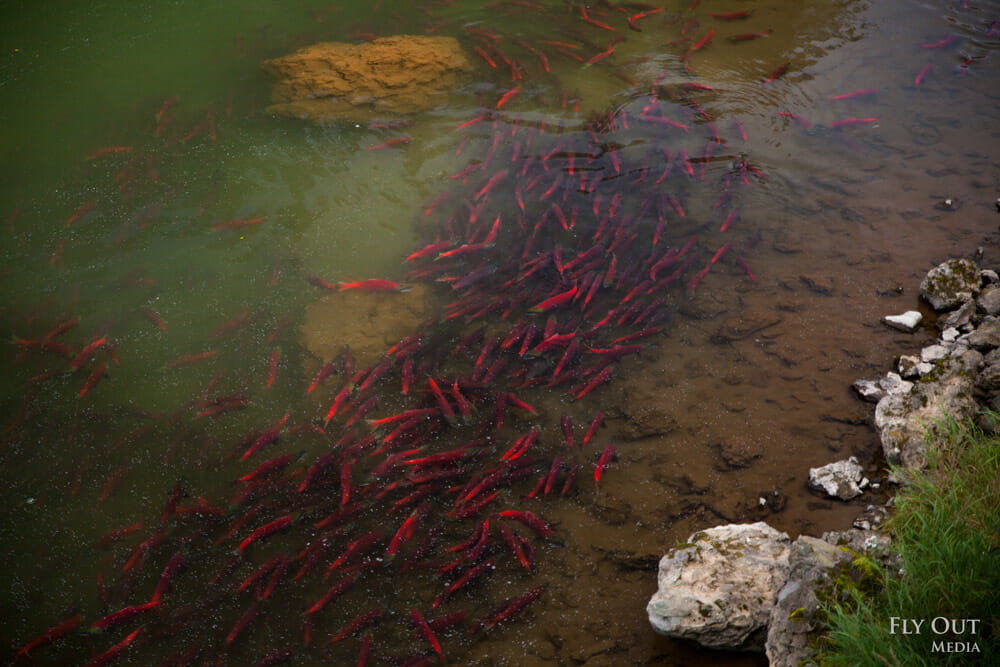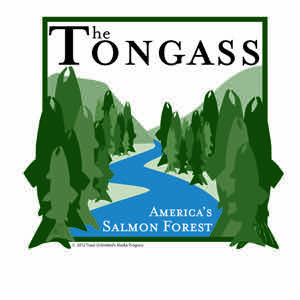
For generations, Alaska has been known as “the last frontier.” For anglers, it might be better known as the Salmon Frontier. Alaska is, simply put, the best of what’s left. It’s home to the largest salmon runs left in America and, in some cases, the world. Here, anglers share the rivers and streams with mighty brown bears. Only in Alaska can one cast a fly beneath the canopy of the healthiest temperate rainforest left on the planet. And only here can an angler pursue all five Pacific salmon, as well as rainbow trout, steelhead, coastal cutthroat trout, Dolly Varden, Arctic char and Arctic grayling.
It is an angler’s paradise… a place like no other.
Trout Unlimited’s Alaska Program collaborates closely with commercial fishermen, anglers, tribes, chefs, and many others who care about trout and salmon. We work to preserve, protect and restore wild salmon and trout populations throughout the country’s largest, wildest and most fish-rich state. Although Alaska has some of the most abundant and healthiest salmon and trout, these fish face a variety of major threats. Through sound science, strong grassroots outreach and advocacy, and hands-on involvement in conservation, Trout Unlimited fights to protect some of the most pristine and prized rivers on the planet, focusing on Bristol Bay in southwestern Alaska, the Eklutna River in Southcentral and the waters of the Tongass National Forest in Southeast.
- In Bristol Bay, TU is involved in a national campaign to protect this region, home to the world’s largest sockeye salmon run, from the massive Pebble mine proposal. Learn more here.
- With partners and the local tribe, TU has worked to restore the salmon run to the lower Eklutna River. Learn more here.
- In the Tongass, TU is championing an effort to conserve the 77 most high-value salmon and trout watersheds that remain open to development activities that can harm fish.
- TU also works to protect the three major salmon rivers of Southeast Alaska – the Taku, Stikine and Unuk – from large-scale B.C. mining developments that lie directly upstream.
- In addition to these major efforts, TU also works to restore fish habitat across the state that may need some help, and it engages the next generation of coldwater stewards in Alaska’s natural heritage.
Where we work

Bristol Bay is home to one of the most sought after angling experiences on the planet. Tucked away in an isolated corner of southwest Alaska, famed rivers such as the Kvichak, Nushagak and Upper Talarik Creek pulse with the world’s largest run of sockeye salmon and boast monster rainbow trout that haunt the dreams of anglers world-wide. This prime fishing destination faces an epic threat to the region’s fish, jobs and a way of life for thousands of Alaska Natives. A massive gold and copper prospect, known as Pebble, lies in the headwaters of Bristol Bay and developers are investing millions to turn it into one of the world’s largest open-pit mines. If Pebble gets developed, the likelihood of mine pollution affecting Bristol Bay is virtual certainty, and the loss of prime salmon and rainbow trout habitat is unquestionable. Learn more and take action here.

After three years of hard work, the Lower Eklutna Dam was removed during the summer of 2018. This is a monumental occasion for salmon who can now access 22 miles of upstream habitat for the first time in 89 years and for the people of the Eklutna tribe, whose namesake river was dammed, and salmon runs nearly wiped out without notification or consultation. In 2018, Trout Unlimited hosted a workshop in partnership with the Native Village of Eklutna and numerous state and federal agencies to explore how much water needs to be released from the Upper Eklutna Dam to allow for salmon to make a full recovery in the Eklutna River and how this objective can best be accomplished. Trout Unlimited will continue to track the obligated mitigation of the impacts of the Eklutna Power Project by Anchorage utility providers to ensure that water is returned to the river for fish and the people of the Eklutna Native Village. Learn more and weigh in here.

In the Tongass National Forest, Trout Unlimited is working hard to protect what is literally America’s salmon forest – one of the few places in the world where wild salmon still thrive. In collaboration with commercial and recreational anglers, scientists, land managers, GIS experts and others, TU has developed a strategy for protecting in perpetuity the forest’s most high-value salmon and trout watersheds. It’s called the Tongass 77. This legislative proposal grew from peer-reviewed science and state-of-the-art GIS tools that identified the top watersheds for salmon and trout not currently protected from development. These 77 watersheds comprise 1.9 million acres of the Tongass. Based on their outstanding habitat values, the highest and best use of these 77 watersheds should be for the production of salmon and trout. Trout Unlimited, together with a growing coalition of commercial and sport fishermen and other salmon advocates, is urging Congress to enact Tongass 77 legislation to ensure that the Tongass remains America’s salmon forest for current and future generations.
While TU works on protections for key areas of the Tongass National Forest, we are also working to safeguard the three major salmon rivers of Southeast Alaska. British Columbia is expanding mining in the headwaters of international, salmon-bearing rivers, alarming elected leaders, fishermen, Tribes, businesses and conservationists in Alaska and beyond. Thousands of Alaskans are calling on their Alaska Congressional Delegation to bring this issue to the U.S. Secretary of State and commence a full review of the region by the International Joint Commission under the Boundary Waters Treaty. The message is clear: it’s unjust for Americans to bear the monumental risk posed by upstream mining projects that offer them no economic benefit and over which they have no say.
About and Contact
We love hearing from members and supporters, whether you live in Alaska or are just up for a visit.
Send us a note:
- Nelli Williams, Alaska Director – nwilliams [at] tu [dot] org
- Austin Williams, Alaska Legal and Policy Director – awilliams [at] tu [dot] org
- Marian Giannulis, Alaska Communications Director – marian.giannulis [at] tu [dot] org
- Eric Booton, Alaska Sportsmen’s Engagement Organizer – ebooton [at] tu [dot] org
- Meghan Barker, Bristol Bay Organizer – mbarker [at] tu [dot] org
- Mark Hieronymus, Sportfish Outreach Coordinator mark.hieronymus [at] tu [dot] org
- Alexa Millward, Kenai Peninsula Engagement Coordinator – alexa.millward [at] tu [dot] org
- Riley Gallagher, Southeast Alaska Restoration Biologist, riley.gallagher [at] tu [dot] org
- Matt Boline, Southeast Alaska Community Engagement Manager, matt.boline [at] tu [dot] org
- Jessica Speed, Mat-Su Salmon Habitat Partnership Manager, jessica.speed [at] tu [dot] org

